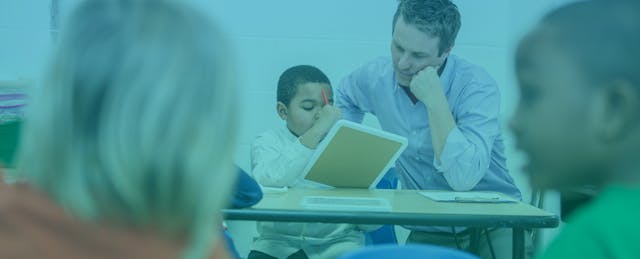A trip to Hiroshima, Japan early in his teaching career set Eric Westendorf on a path to revolutionize curriculum.
“I spent two weeks in schools observing teachers planning and teaching," he says. "It was fascinating.” He saw teachers meet as a group to plan lessons that addressed students’ needs, watch each other in the classroom and then provide feedback and suggestions.
But what resonated most with Westendorf was the way educators approached curriculum. Japan's Ministry of Education had a standard curriculum, but individual teachers could adapt or innovate lessons—and then send their ideas back to the Ministry of Education to be vetted and added to the national curriculum. “So over time, the curriculum gets better and better. I loved it!”
Fast forward ten years. Westendorf melded the lessons he learned in Japan with his Stanford MBA and years of experience teaching and leading schools. The result is LearnZillion, serving up teacher-developed math and English Language Arts curriculum through an innovative curriculum-as-a-service model. EdSurge recently spoke with the CEO of LearnZillion to learn more about his plans to revolutionize curriculum.
EdSurge: What prompted you to create LearnZillion?
Eric Westendorf: I was Chief Academic Officer of a school in D.C. called E.L. Haynes Public Charter School. Every one of our teachers was adapting a static curriculum to meet the needs of his or her particular class day in and day out. But we had a problem. If our amazing sixth-grade teacher decided to move back to Florida, our sixth-grade math program would fall apart. All of those adaptations, all of that expertise was in her head. We didn’t have a system to capture that work so that teachers could stand on the shoulders of those who came before them.
I got the teachers together and said, "Can we try to capture this digitally in a way that could be shared with other teachers in the building?" Suddenly all those classes I took at Stanford about scale and entrepreneurship triggered an idea. We had amazing teachers at E.L. Haynes, but there are amazing teachers across this country, and the problem is they're all isolated. Is there a way to find them, coordinate their activity and capture their expertise? That prompted my partner and me to create LearnZillion and become the first curriculum-as-a-service company.
Curriculum-as-a-service—that’s a new term. How does it work?
We’re changing curriculum from a physical, static, mostly paper-based product that school districts buy and own, to curriculum as a cloud-based service. Curriculum-as-a-service is dynamic; it enables and encourages adaptation, improvement over time, and customization. It does all that in the cloud so it can be shared and scaled easily and in a much more cost-effective way.
It’s similar to the way we’ve moved to services like Spotify or Pandora for music. What you get is the ability to personalize curriculum, to customize it, have it know what your tastes are and have much more power over your own preferences.
We provide free accounts to teachers and they get access to a meaningful fraction of the content as part of our curriculum-as-a-service package. Right now we have 1,400 full lessons plans for math, and 2,000 full lesson plans for English language arts, plus thousands of instructional videos, activity worksheets and other supporting materials.
Then we have an enterprise version focused on helping districts that don’t want to buy static curriculum. This model enables us to provide base-curricular materials to a district, but we also provide the features that you’d expect of an LMS so districts can add and create their own curriculum. We provide features that give them control.
How does that play out in the classroom?
There’s a lot of flexibility. Let’s use a multiplication problem as an example. The teacher can decide to project the lesson and lead it whole-class. But she can also decide to assign the lesson to groups to work on collaboratively, or to individuals to work on independently, while she works with the rest of the class. Suddenly, setting this all up is really easy with the tools in LearnZillion. But with a static curriculum model, the amount of work a teacher would have to put in to try and do any of those things—it’s just not feasible that a teacher could do that day in and day out.

What kind of success are you seeing?
One in three U.S. teachers—1.4 million—are registered on the LearnZillion site, with hundreds of thousands accessing content every week.
Districts are also figuring out how to localize curriculum. Newark Public Schools recognized their teachers were struggling with teaching reading. They were all trying to do good things, but not in a coordinated fashion. They decided to use LearnZillion to craft their curriculum so it focused on text-dependent questions and writing about reading.
Less than one year later, teachers are on pace, there’s consistent pedagogy focused on the text-dependent questions, and they’re seeing strong results on their interim assessments around reading comprehension and writing about reading. Sixth grade literacy interim assessments showed students scored the highest in classes where teachers used the new curated content. You just can’t just do that if you’re not adapting your curriculum and localizing it.
What are your plans for the future?
Our goal is to redefine curriculum in this new paradigm and to be the leader of curriculum-as-a-service. Five or ten years from now, we want folks to look back and say, "Remember when we had these static textbooks and we thought about curriculum this way? That was rough. It’s so much better now that we can actually create, author and manage our curriculum and adapt it in ways that work with our students, and then track how it goes.”
Ultimately we want educators to have super high-quality base material for every core subject, material that’s been crafted lovingly by some of the top teachers in the country. You’ll be able to stand on the shoulders of that and adapt it and make it even better for your kids.
What do you like to do when you aren’t re-inventing how schools approach curriculum?
Well, I’m a father of three kids. I have a five-year-old, an eight-year-old, and an eleven-year-old. I like to spend a lot of time with my kids, just doing all sorts of playful things. My daughter is becoming a really good climber. My boys would probably wrestle 24/7 if they could. And I like to play ultimate Frisbee; it’s both intense and something you can just endlessly learn from.



